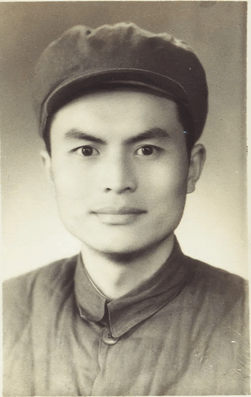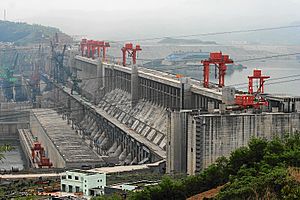Li Rui (politician) facts for kids
Quick facts for kids
Li Rui
|
|
|---|---|
|
李锐
|
|

Li in 1947
|
|
| Member of the 12th Central Committee of the Chinese Communist Party | |
| In office 1982–1987 |
|
| Vice-director of the Organization Department of the Chinese Communist Party | |
| In office 1983–1984 |
|
| Vice-minister of Water Resources | |
| In office 1955–1958 |
|
| Personal details | |
| Born | April 13, 1917 Pingjiang County, Hunan, China |
| Died | February 16, 2019 (aged 101) Beijing, China |
| Political party | Chinese Communist Party |
| Spouses | Fan Yuanzhen (1940-1962) Zhang Yuzhen (1979-2019) |
| Children | 3 |
| Alma mater | Wuhan University |
Li Rui (simplified Chinese: 李锐; traditional Chinese: 李銳; pinyin: Lǐ Ruì; April 13, 1917 – February 16, 2019) was an important Chinese politician, historian, and a member of the Chinese Communist Party (CCP). He was known for speaking his mind, even when it meant disagreeing with powerful leaders.
As a young student, Li joined the communists in 1937 during the Chinese Civil War. By 1958, he became a top official in the Ministry of Water Resources. He strongly disagreed with building the Three Gorges Dam. This caught the attention of Chairman Mao Zedong, who made Li his personal secretary.
However, Li was an independent thinker. He openly disagreed with Mao at a meeting in 1959. Because of this, Li was removed from the party and sent to a prison camp. This started nearly twenty years of political trouble for him. He spent eight years alone in Qincheng Prison.
After Mao's death, Li got his party membership back and became influential again. But he soon had to leave his role because he refused to give special treatment to the children of powerful party members. From the mid-1980s, Li wrote and spoke a lot. He called for things like freedom of speech, freedom of the press, and more democracy in China. He also wrote five books about Mao and the early history of the Communist Party.
Li stayed a party member until he died at age 101. He was respected but also kept separate because of his views. His ideas were officially criticized, and he was not allowed to be published in the Chinese news. The Guardian newspaper said in 2005 that Li lived a life "filled with rebellions, often at great personal cost, against those who abused their power."
Contents
Li Rui's Early Life
Li Rui was born Li Housheng in Pingjiang County, Hunan Province, in April 1917. His family was wealthy. His father was part of a revolutionary group that opposed the old imperial rule. Sadly, his father died in 1922 when Li was only five.
When he was in high school in Hubei, Li protested against the rule of powerful warlords. In 1934, he started studying mechanical engineering at Wuhan University. As a student, he joined movements against Japan, which was occupying parts of China at the time.
Li Rui's Political Journey
Becoming a Young Communist Activist
Li secretly joined the Chinese Communist Party in February 1937. He was a very active member. The Republic of China's government, led by the Kuomintang, briefly put him in jail for his communist activities.
In the late 1930s, Li traveled on foot to the Communist base in Yan'an. His mother told him, "The Communists are good, but you might get killed." He worked as a writer for the Communist newspaper Liberation. He often criticized other communists, which led to him being imprisoned for a year as a suspected spy. The New York Times later described Li as "blunt, brash, and quick-witted."
From December 1939, he led the propaganda section of the party's youth committee. In September 1941, he became an editor for the Jiefang Daily newspaper. He also worked as a secretary for Chen Yun, who later helped shape China's economic changes.
Working for Mao and Facing Hard Times
In 1945, Li became a secretary to Gao Gang. After the Communists won the civil war, Li joined the Ministry of Water Resources in October 1952. By 1958, he became its deputy head, making him the youngest vice-minister in China.
Li strongly opposed building the Three Gorges Dam. This caught the eye of China's leader, Mao Zedong. Mao invited Li to Beijing to discuss the issue and was impressed by Li's passion and intelligence.
Mao hired Li as his personal secretary for industrial matters. However, Li soon started criticizing Mao's policies, especially the Great Leap Forward. He also supported Peng Dehuai, another official who disagreed with Mao. At a meeting in 1959, Li continued to oppose Mao's ideas. He was then labeled an "anti-Maoist conspirator." Li later said that Mao did not seem to care about the suffering caused by his policies.
Li was sent to a prison camp near the Soviet Union border. He almost starved there. Friends helped him get transferred to a camp where it was easier to survive. He lost his Communist Party membership. He was offered early release if he would stop criticizing Mao, but he refused.
Li was released in 1961 and returned to Beijing. His marriage ended due to political differences. One of his daughters, Li Nanyang, had a difficult relationship with him after he made private remarks that were critical of Mao. He was sent to teach at a small school in the mountains, which kept him away from political life.
In 1966, Mao's Cultural Revolution began. Li was asked to criticize his old colleagues who had been Mao's private secretaries. He refused. Because of this, he was held alone in Qincheng Prison. Li kept his mind active by secretly writing poems in the margins of books using iodine from the prison's medical supplies. He was released in 1975 and sent back to teach in the mountains.

Returning to a Key Role
After Mao's death in 1976 and the rise of Deng Xiaoping, Li got his party membership back. In 1982, he was chosen for the Central Committee of the Party. In 1983, he became the vice director of the Organization Department. This was an important job that involved promoting, demoting, and hiring senior officials within the party.
However, in 1984, he had to leave this role. According to the New York Times, he was unwilling to "give special preference to the children of senior officials."
Li had first become known for opposing the Three Gorges Dam. He continued to fight against its construction throughout the 1980s, working with environmentalist Dai Qing. In 1989, Li saw the violent crackdown in Beijing during the Tiananmen Square protests. This made him even more opposed to the party's strict leaders. He was a friend to reform-minded leaders like Zhao Ziyang and Hu Yaobang.
A Party Elder, Historian, and Critic
After officially retiring in June 1995 at age 78, Li became known as an older, respected party member and a historian of Mao. He wrote five books about Mao's life and the party's history. His books openly criticized Mao and current party leaders.
The Economist newspaper called Li the "veteran liberal member" of the CCP. Li argued for free speech, freedom of the press, and democracy within China's socialist system. In November 2004, the party's Propaganda Department banned Li from being published in the media. His books about Mao were censored and banned in Mainland China.
Li was seen as a challenge to the Communist Party's strict leaders. His personal name, Rui (锐), means "sharp" in Chinese. In 2013, his views were secretly but officially called "subversive," meaning they were seen as trying to overthrow the government.
Before every five-year Communist Party congress, Li wrote to other senior party members. He pushed for political changes. At the 16th Party Congress in 2002, Li wrote an open letter to the new party leader, Hu Jintao. In the letter, Li said that following a constitution would help the Communist Party avoid mistakes like the Anti-Rightist Movement, the Great Leap Forward, and the Cultural Revolution.
In 2006, he was a main signer of an open letter criticizing the government for closing the investigative newspaper Freezing Point. Before the 17th Communist Party Congress in 2007, Li and a retired professor named Xie Tao wrote articles saying the Communist Party should become more like European socialist parties. The party's propaganda group criticized these remarks. In October 2010, Li was the main signer of an open letter to the Standing Committee of the National People's Congress, asking for more press freedom.
In 2017, Li did not attend the 19th Party Congress. This was seen as a sign of his disagreement with General Secretary Xi Jinping's increased power. Li had spent his life dedicated to the Communist Party and never thought of leaving it. However, he wrote in a poem that the modern party showed "arrogance, ignorance, shamelessness, lawlessness."
Li Rui's Personal Life
Li was married to his first wife, Fan Yuanzhen, for twenty-two years, from 1940 to 1962. They had two daughters and a son. Fan passed away in 2008. His second wife was Zhang Yuzhen; they married in 1979.
Even as he got older, Li stayed mentally sharp. Despite his political views, he was allowed to keep his special benefits as a senior CCP member. These included better medical care and an apartment in "Minister's House," a building for respected retired party officials. Li kept a diary every day from 1935 until 2018. This diary is now kept at the Hoover Institution in California. The diary and Li's other papers were part of a legal case in 2019.
Death and Funeral
Li died from organ failure in Beijing on February 16, 2019, at the age of 101. As an early and senior member of the Communist Party, Li was given a state funeral. He was buried at the Babaoshan Revolutionary Cemetery. This was despite his wish to be buried with his parents in Hunan, his home province.
News of his death was limited by official censorship. His funeral was held with "secrecy and security." Even with these rules, hundreds of people came to the funeral. These included ordinary Chinese citizens and some of his old colleagues and fellow revolutionaries who were still alive. Even though Li strongly disagreed with their policies, both of China's leaders, General Secretary Xi Jinping and Premier Li Keqiang, sent wreaths.
See also
 In Spanish: Li Rui para niños
In Spanish: Li Rui para niños

